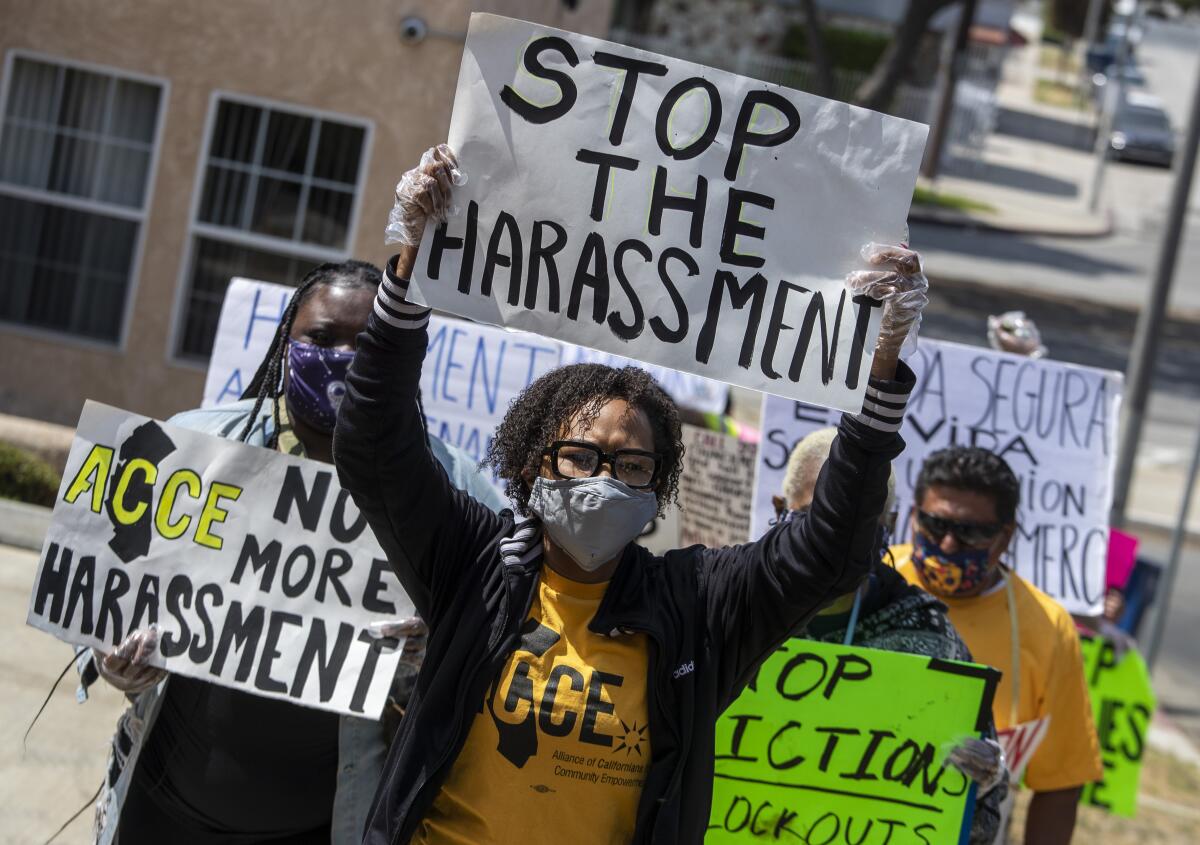L.A. is poised to ban tenant harassment. Here’s what the proposed law covers

- Share via
Los Angeles is poised to ban landlords from harassing tenants, under a new law meant to beef up legal protections for renters facing coercion and mistreatment. The ordinance will be drawn up by city lawyers after the Los Angeles City Council backed the plan Wednesday.
What exactly is being banned under this law?
The L.A. ordinance, as proposed, will define “tenant harassment” as a “knowing and willful course of conduct” aimed at a specific tenant or tenants that causes harm and has “no lawful purpose.”
Here are some specific examples included in the proposed ordinance:
— Threatening tenants with physical harm
— Eliminating housing services that are required under a lease
— Deceiving residents about whether they are required to move out
— Asking for information that violates tenant privacy “except as authorized by law”
— Revealing the immigration status of a tenant to others or threatening to do so
— Trying to coerce a tenant to leave by offering them payment
— Neglecting to make repairs or do maintenance
— Failing to follow standards to protect renters from asbestos, dust, lead paint and other health hazards
— Retaliating against tenants for forming a tenant association or interfering in tenant organizing efforts
— Improperly entering a rental unit or taking photos inside “beyond the scope of a lawful entry or inspection”
— Doing anything to make the unit “unfit for human habitation”
— Refusing to acknowledge or accept lawful payments of rent
Beyond those and other examples spelled out in the ordinance, the law bans any actions that “substantially interfere with or disturb the comfort, repose, peace or quiet of a tenant” and are meant to make the tenant give up their unit.
What happens if a landlord violates these rules?
Under the planned ordinance, tenants or their representatives can go to court to stop landlords who violate the law, seeking civil penalties of up to $10,000 per violation, plus another $5,000 each for violations affecting elderly or disabled tenants. Violating the ordinance could be punished as either a misdemeanor or an infraction.
L.A. could soon usher in a new law that would ban landlords from harassing renters. Landlords oppose the measure, citing several objections.
Tenants may also be awarded attorney fees, damages, rent refunds and “other appropriate relief” if they prevail in court, according to the proposed law. Renter advocates pushed unsuccessfully to change the wording to say that victorious tenants “shall” be awarded attorney fees, arguing it would ensure more lawyers agree to take on such cases.
If a landlord is found to have harassed someone out of a rent-stabilized apartment, the property owner can be barred from charging more to the next tenant who follows that person. That penalty is meant to take away the financial incentive for a landlord to push out a longtime renter paying a lower rate so that they can charge more to a new tenant.
Tenants could also bring up such harassment as a defense, in court, against an attempted eviction.
Do tenants have to warn landlords before taking them to court?
In some cases. Under the proposed law, tenants cannot take their landlords to court over allegations of neglected repairs or failing to follow standards to minimize dust, asbestos and other health hazards unless they have provided written notice of the alleged violation and the landlord has failed to fix the problem within “a reasonable period of time.”
Why did tenant advocates fight for this new law?
Tenant groups said the L.A. ordinance will give tenants a crucial tool to fight harassment meant to prod them out of their homes as rents have risen. Similar rules exist in San Francisco, Santa Monica and West Hollywood.
At a news conference Wednesday outside City Hall, tenants said they had suffered from having their electricity cut, being threatened with arrest, and other indignities from their landlords.
Legal advocates argued that by spelling out what kinds of actions amount to harassment, the new ordinance will make it easier for aggrieved renters to pursue a case, rather than trying to figure out whether it is covered by existing laws.
Landlord groups, in turn, contended that the new law will trigger baseless claims and complained that it does not address cases in which tenants harass property owners.
Are there any sticking points?
Tenant groups said they were happy to see the law moving forward Wednesday, but raised concerns that defining harassment as something with “no lawful purpose” could make it harder for tenants to prove their case when a landlord does something that has an ostensibly legal justification, but is nonetheless meant to target a resident.
During the Wednesday meeting, Councilwoman Nithya Raman asked about those concerns. Harassment “takes a lot of different forms, but sometimes it looks like totally legal actions that a landlord is allowed to take, like taking away a parking space,” Raman said.
David Michaelson of the City Attorney’s Office replied that in such a case, it would be “something that, ultimately, a court would have to decide.” Councilman Gil Cedillo said that if city lawyers could come up with better wording, he would support it, but “there is a point where we have to move forward and not make perfection the enemy of the good.”
What happens now?
Council members voted Wednesday to ask the City Attorney to prepare a revised version of the ordinance that includes amendments backed by the council. The final wording of the law will be presented again to the council for its approval.
More to Read
Sign up for Essential California
The most important California stories and recommendations in your inbox every morning.
You may occasionally receive promotional content from the Los Angeles Times.















